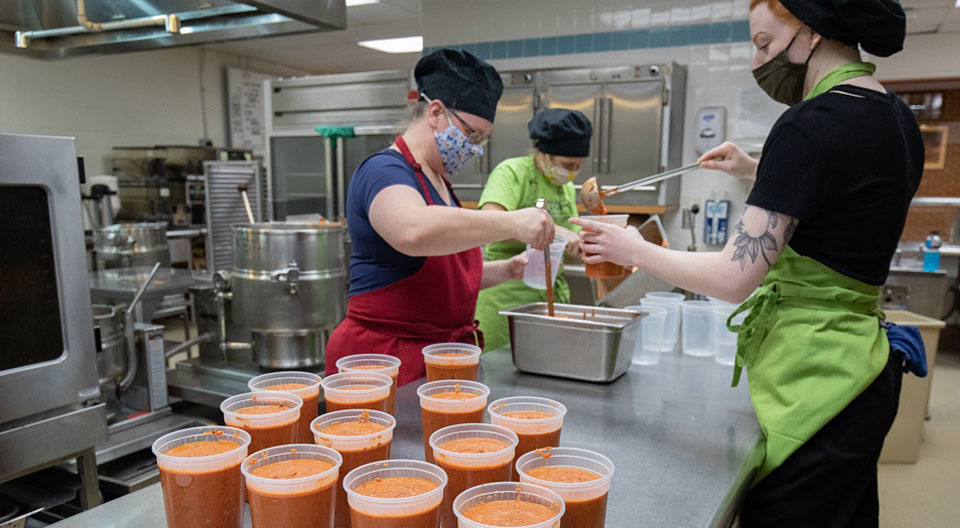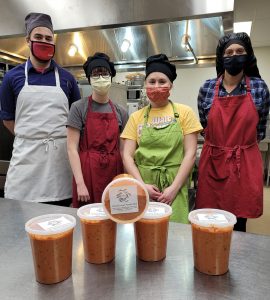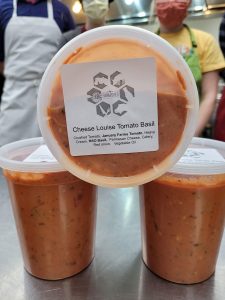

Nothing says comfort food more than a hot bowl of homemade soup, especially during the cold winter months.
A partnership between the University of Wisconsin-Stevens Point and Central Rivers Farmshed is bringing some of that comfort into homes in Central Wisconsin. Senior dietetics students are using a practicum class to create a variety of homemade soups that are for sale through Farmshed’s Buy a Quart, Donate a Meal program. Profits support Farmshed’s food security efforts in providing local foods to community food banks.

Traditionally these students serve their senior practicum semester creating and serving food in the CPS Café on campus. COVID-19 closed the café, so the students pivoted to helping community programs where their quantity food production skills are beneficial. In addition to producing hundreds of quarts of soup this semester, they are writing educational materials on cooking with local food for a newsletter that Farmshed distributes to its food security partners in the community.
“There is a natural partnership between the university dietetics program and Farmshed,” said Kim Damrow, director of the CPS Café. “We both focus on using local foods for our programs and many of our students are Farmshed volunteers and interns. Working with Farmshed gives our students the opportunity to make an impact in the community where some have been financially affected by COVID-19.”
Farmshed’s local food manager Trevor Drake earned his bachelor’s in dietetics and master’s degree in sustainable and resilient food systems from the UWSP School of Health Sciences and Wellness. He was a graduate assistant of the CPS Café as a graduate student, so he has continued his working relationship with Damrow.
“It feels good to be back working with the university,” he said. “The students are seeing a full circle of a sustainable food system, and they are helping us develop it. They are also helping us increase the volume of food we can provide in the community.”
Each week, the students create a new variety of soup that is packed into quart containers and provided to Farmshed. Orders are taken at the “shop” link at farmshed.org between Thursday and Monday each week, with soup available for pick up or delivery on Wednesday.

The soups are created through local recipes and with local foods. The first week, the students used a tomato basil soup recipe from the former Cheese Louise restaurant. The tomatoes came from January Farms in Custer and the basil from Rising Sands Organics cooperative in Central Wisconsin and the Fox Valley. Pumpkin curry, with pumpkins from Red Door Farms in Wausau, was next on the docket, along with Trevor’s chili (a recipe from Drake).
“We are making something delicious and nutritious from scratch,” said Summer Manzke, a senior dietetics student from Sullivan, Wis. “Being able to share that with the community feels really good.”
In addition to the soup, the students will also assist with the Sib Pab program at Farmshed later in the semester. Sib Pab, which means helping hands in the Hmong language, provides traditional Hmong meals to Hmong elders and disabled in the community. The dietetics students will assist Hmong chef Henry Vang at Farmshed in making food then will deliver the food and write about their experiences.
“Having that cultural awareness experience will be relevant to their careers as dietitians,” Damrow said. “It is vital to understand how to meet nutritional needs while also meeting cultural needs.”
Many students will use the hands-on skills learned during this practicum as they serve a required 10-month internship and in their careers in professional kitchens and food service for schools, hospitals and other public facilities, Damrow said.
“We are giving our students the knowledge of the impact their cooking can have on their community, now and in the future.”
Related News:
News release courtesy of University Communications and Marketing
WAOW: UWSP dietetics students partner with area non-profit providing meals to less fortunate
WSAW: UWSP dietetics students gain restaurant experience while fighting food insecurity
